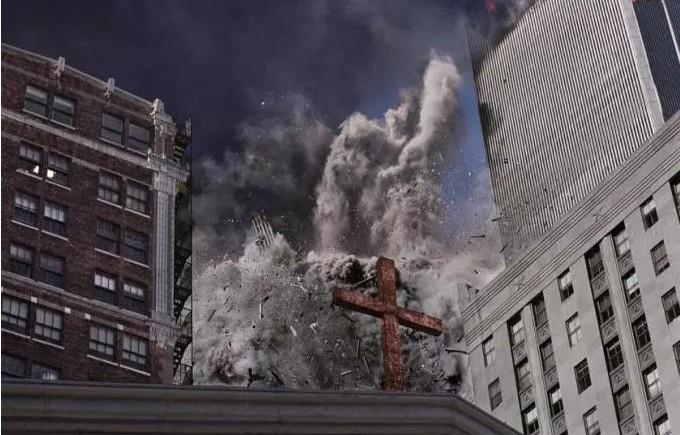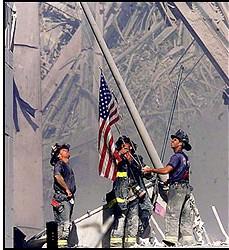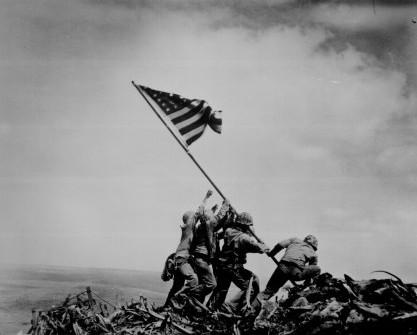
The 9/11 format and its consequences
In early 2002, I published an article co-written, in Dutch, with my MA class of that time. The article offered an analysis of international media reporting of the events of September 11, 2001 - the attacks on the WTC towers in Manhattan and the Pentagon near Washington. This analysis had been done upon the students' request. My class that year was scheduled to address different topics, but the 9/11 crisis was so dominant that we decided to sink our teeth into the media coverage of it - and into the ways it had affected all of our minds. I am writing this text on the day after the Brussels attacks of March, 22, 2016 - and believe it may be worth returning to that earlier analysis.
The 9/11 format
The conclusions of our analysis can be summarized as follows. First, there was uniformity: the same images, explanations and arguments, and the same expert voices, "went viral" straight after the events in a perplexing show of global media uniformity. Within hours after the planes hit the Twin Towers, a worldwide "script" was circulating in all major media outlets.
Two, this script was manufactured before any clear and decisive factual evidence was available. News media all over the world interrupted their programs and went for a nonstop "breaking news" format (a constant element since then). For many hours, such "open studio" programs offered little else than an endlessly recycled loop of the same images, repeated over and over again, interlarded with every possible rumor that could be passed on by - literally - anyone. Confusion reigned, of course, and journalists knew as little and were as disoriented as we, humble spectators. And so every speculation, fantasy and fear could be offered as "unconfirmed reports" to the audiences around the world - runors of more suspect planes flying over the US, of planes being downed by US Air Force jets, of Palestinians in the West Bank cheering at the news, and so forth. "News", that day, acquired a weird and seemingly unrestricted semantic elasticity.
In spite of the absence of a flow of hard facts, certain "facts" emerged very soon. The name Osama Bin Laden, for instance, was mentioned (and, consequently, consistently repeated) long before any clear indications were discovered about Al Qaeda's involvement. To Bin Laden, the Afghan Taliban-regime was instantly added, as well as, more peripherally, the Palestinians, Muslims in general, and the "rogue states" that made up Reagan's infamous "Axis of Evil" - think of Irak and Iran in particular. As soon as those names appeared, the quest for other possible perpetrators ceased. The bad guys in the script, thus, were known in the first few hours after the attacks, long before any evidence tied them to the attacks. And by whom? by "analysts" from the FBI, the CIA, and "experts" such as the former Israeli Prime Minister Barak.
Three, the reporting was - and this sounds wrong of course - arrestingly aesthetic. The images that went around the world were extraordinarily beautiful. Longshots of the tip of Manhattan, with the miles-long smoke colums drifing over the water, fantastically framed images of the collapsing towers, and even this superbly composed picture of Pulitzer-winning war photographer Jim Nachtwey:

James Nachtwey's picture of 9/11
In the days following the drama, more estheticized images circulated, sometimes overtly referring to US political propaganda. Consider, for instance, this famous picture of New York firefighters raising the flag on the WTC rubble, and compare it to the legendary Iwo Jima photo (which was, in turn, converted in the Marines Monument in Washington DC):

NY Firefighters raising the flag on Ground Zero

Iwo Jima 1944
The visual power of the media reporting, thus, was stunning and unprecedented in scale of distribution. And it contained a grammar of visual design which was not politically neutral - Nachtwey's picture opposes the collapsing WTC towers - an attack by Islam - to an embattled Christianity, and the reference to Iwo Jima puts the Twin Towers in a lineage with US war efforts and their heroes.
For this is point four. Three roles were highlighted throughout the media reporting: victims, perpetrators and heroes. We have seen who the perpetrators were and how quickly they were identified. The heroes were the firefighters, the police and secutity forces, the Mayor of New York Giuliani, members of the Bush administration such as Rumsfeld (reported to have personally assisted in search-and-rescue operations after the Pentagon attack), and numbers of "small" heroes. The heroes filled many hours of human interest reporting. As did, of course, the victims - not just the direct victims (those who perished or got injured in the attacks) but also the panicking public, the shocked and dazed witnesses and the thousands of ordinary Americans all over the country who cried on camera and decorated themselves, their cars and houses with US nationalist emblems.
To the extent that "rational" actors appeared - the experts, politicians and analysts - they all rode on emotions. Statements such as "I have no words to express my horror", "our first thoughts are to the victims" or "we should take time to heal our nation" prefaced political statements suggested to be "of secondary importance at presence"; the statements themselves remained - once more - at the level of general emotional appeal: we learned the phrases "an attack against freedom", "against democracy", "against our way of life" then and there. Such statements, even if emotive, had enormous effects. Bush, tears in his eyes, divided the world into "those wo are for us and those who are against us", and unleashed a "war on terror" which, fifteen years onwards, still causes immense suffering around the world (and whose innocent victims, let it be added, see "those who are for us" and "those who defend freedom" as simple terrorists). They turned the US into a Patriot Act society, in which "terror suspects" have been unlawfully detained and abused in places such as Guantanamo for 15 years now.
Summarizing these points, the news reporting was outspokenly - almost exclsuvely - emotive. It showed emotions, it constructed and played into emotions of shock, distress, fear, anger and pride. The 9/11 format was a format of emotive mass-response. In terms of facts, the main fact we received was, precisely, emotional: we should all be upset, sad, enraged and proud about 9/11 - regardless of what exactly happened then. The mass emotional response was the way in which 9/11 was reported.
Stop thinking, let's cry
I have seen this format, down to its details, re-occur since 2001 in almost any reporting of similar events - the London and Madrid bombings, the attacks on Charlie Hebdo and the Bataclan in Paris, and of course yesterday after the bombings in Brussels. September 11, 2001, let me note, preceded the advent of social media. And what we have seen since the breaktrough of Facebook and Twitter is a colossal "echo chamber effect" in which this very scenario acquires even more strength and impact, and ... even more uniformity. It creates, to put it bluntly, a form of political correctness in which one particular, complex, moralized behavior script is seen as the only adequate public response to such events. And that behavioral script can be summarized as "stop thinking, let's cry".
The response to the Charlie Hebdo attack in Paris, January 2015, was an emotional tsunami, with millions of people (most of whom, of course, had never even seen a copy of Charlie Hebdo magazine) posted "Je Suis Charlie" as their banner or profile picture on social media, and took it to the streets in mass mournings.
The same happened after the November 2015 attacks in France: French flags were posted and "mourning" (preferably in public and on social media) was the only acceptable response. Observe that the French government issued a prohibition on public manifestations soon after the attacks, and announced that it might have to suspend the European Charter of Human Rights for a while, in the name of security.
The Brussels attacks were no exception: while confusion reigned about the what-who-why of the attacks, "mourning" again became the framework of response, and people deviating from that political correctness (I plead guilty) were bitterly reprimanded: "have you no heart?" "this is no time for politics", "you have no respect for the victims", "can't you wait until tomorrow before you start analyzing?" and so forth. So public mourning was what had to be done, it was the only adequate public action to be taken yesterday.
There is nothing wrong with emotions, naturally, and I too was profoundly shocked and grieved by what had happened. Friends of mine were at Brussels Airport when the bombs detonated, and I couldn't stop wondering what would have happened if the attackers had chosen to execute their plan a few days earlier, late last week, when I was passing through that Airport. Yes, emotions are part of it.
It becomes highly problematic, however, when only emotions dominate the response, when there is nothing else besides the emotional response. For - remember the structure of the 9/11 format - this direction of response zooms in on one range of phenomena, even suggests that those are the only phenomena that matter. While much more is happening, and much bigger things are at stake. The structure of the news reporting, for instance, is of critical importance, for it is the only window through which most people "know" such phenomena. News reporting, therefore, needs to be carefully monitored. Political responses as well, for even if they are (as we saw earlier) prefaced by solemn expressions of deep emotional solidarity, and even if they are qualified as "of minor importance" compared to the suffering of the victims and the pain and grief of the public, they change our societies.
In Belgium, but I suspect in France as well, the overwhelmingly emotional political correctness has covered and obscured a strengthened political undercurrent of increasing racism and Islamophobia, and (unsurprisingly) a tendency to extra-parliamentary and totalitarian "special powers" governance in the fields of security and policing. This undercurrent has been clearly noticeable since the Charlie Hebdo attacks in Paris, and gained force, of course, in November 2015 when suspects of the Paris attacks were proven to be residents of Brussels.
Since the attacks in Brussels yesterday, the chokingly whispered expressions of emotional upset by leading Belgian right-wing politicians have been blended with bold (and highly questionable) statements in which immigration - think of the refugee crisis - was directly linked to the attacks; with accusations of guilt-by-association against the entire Muslim population of the Brussels district of Molenbeek; with cursory remarks that "evidently", privacy rules should not stand in the way of security demands; and with calls to speed-vote repressive and surveillance measures previously dismissed by the parliamentary majority. All of this has happened within 36 hours after the events, while most of the public looks away, refuses or dismisses rational and critical reflection and diverts its attention to candle marches and silent wakes for peace. Again, there is nothing wrong with such activities - I organized them myself in November 2015 - but one should also remain a cool, vigilant and carefully thinking citizen. Let's cry, but don't stop thinking.
Rational questions
This morning's Belgian national radio brough vox pop fragments from the streets of Brussels. I heard people say things such as "it's a pity, but we'll have to change our lifestyles" - meaning: learn to live with increased surveillance and aggressive random police controls. Totalitarian and repressive policing has been accepted as an inevitability, one day after a terror attack. Or more precisely, after a day of deep and total immersion in a see of emotive response in which we let others do the thinking for us.
And so we find ourselves in a void now, in which those who govern us have been given, apparently by unspoken consensus, the monopoly of rational debate, analysis and conclusion. Our vital role as free citizens in a democracy - to distrust government and to be critical, reasonable and vigilant at all times - has been surrendered, because in the crucial hours of debate and decision-making, we preferred not to pay attention to such details - "wait until tomorrow".
That is sad and potentially very endangering, for there are several rational questions that must be asked.
For example: all European states adopted since 9/11 what can be called the "Patriot Act" model of the "war on terror". The recipes deployed by the Bush administration were globalized, so to speak, as a panacea for the fight against Muslim radicalism. I believe that the attacks of the past year in Paris and Brussels serve as pretty conclusive empirical evidence of the fact that this approach to security - repressive, based on totalized surveillance, and never free of racist and Islamophobic dimensions - does not work. I have trouble seeing the Brussels attacks as proof of successful security policy (and I hope I'm not alone). So: where is the alternative? Are there alternatives being considered? If so, which ones? And if not, why not - knowing that it's hard to solve a problem with the techniques that caused it?
Or again: given that attacks such as the Paris and Brussels ones are exceptional phenomena - even extremely exceptional phenomena (thank heavens) - why would we organize our societies with such exceptions as benchmarks? Why would we allow the exception to become the rule, the "normal state" of a society, when it comes to crime, security and internal peace? Why would we make the murderer into the template of the citizen?
Concretely: the Brussels attacks happened while Belgian society, since more than a year, was already in a state of high alert, with armed soldiers patrolling the streets of the major cities. Now that such measures have proved to be grotesquely inadequate, how much more of the same can we accept? What, in other words, are we ready to accept as a "normal" society?
And so on. The attacks have raised a very large number of such big questions, not just worthy of reflection but in dramatic need of reflection. Because when I look around me, I see people wondering why machine guns are pointed at them at the entrance of the railway station, but quietly moving on towards their platforms - the abnormal has been normalized. When citizens stop reflecting about the distinction between these two dimensions of social organization, or believe that such reflection is best left to others who are not necessarily smarter or more democratically minded than themselves, our society is in great danger.